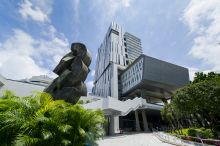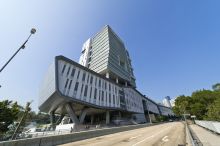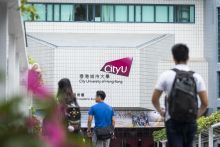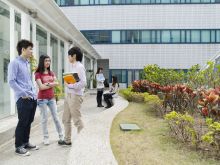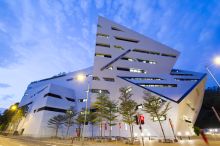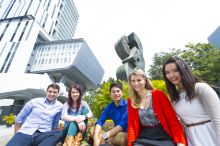Select Colleges or Schools:
CityU Academy of Innovation

The primary objectives of CityU Academy of Innovation (the “Academy”) are to uphold the University’s prominent position in the region and to strive for global leadership in innovation education and talent development.
The Academy will offer a series of innovative academic programmes at the PhD, Master of Science (MSc) and undergraduate (UG) levels, focusing on deep-tech venture creation, to develop a leading international ecosystem that nutures young entrepreneurs, incubates deep-tech start-ups and promotes university-industry collaboration.
The Academy will work closely with the colleges, schools and departments in CityUHK, and industry partners and governments in Hong Kong and beyond. The faculty of the Academy will be composed of selected professors from relevant CityUHK academic units and external experts with extensive industrial and investment experience.
The PhD by Innovation programme will offer doctoral candidates an opportunity to pursue research in innovation-driven fields while emphasizing commercialization-ready ideas and real-world impact. The programme is primarily administered by the Academy, with academic processes supported by the home department of the Chief Supervisor. Industrial advisors from companies and organizations outside CityUHK will also be appointed to provide guidance and support.
As an integral component of the coursework requirement, a Graduate Research and Innovation Trek (GRIT) Integrated Project (CAI8001) will offer an immersive and intensive experience for students. It will provide them with valuable opportunities to engage in entrepreneurial activities, collaborate with industry partners, and develop essential skills in technology transfer and commercialization, including development of business proposals.
Candidates may opt for PhD by Innovation when applying for a regular PhD programme. Please apply via the respective college, school, or department.
Research Degree Coordinator
CityU Academy of Innovation
cai@cityu.edu.hk
Go to Department Website
College of Biomedicine
Department of Biomedical Engineering
The Department offers BEng, MSc and MPhil/PhD degrees in Biomedical Engineering. Research areas of the Department include: (1) Biomedical Imaging and Bioinstrumentation: Advanced biophotonics and novel imaging systems, Image analysis and image-guided interventions, Bioinstrumentation for imaging, disease diagnosis, and therapeutics. (2) Cell and Tissue Engineering: Micro/nanotechnology for cellular engineering, Biomaterial design and engineering for regenerative medicine, drug delivery and nano-medicine, Biomechanics and mechanobiology. (3) Robotics and Artificial Intelligence for Biomedical Applications: Bio/medical robotics and control systems, Artificial intelligence for biomedical applications. (4) Biosensors and Health Informatics: Biosensor and largescale biomedical data, Machine learning facilitated biomedical clouds/service, integrative microfluidic platform for precision medicine, and wearable/smart materials for healthcare.
Research Degree Coordinator
Prof. DONG Lixin
3442-9545
3442-0172
lixidong@cityu.edu.hk
Department of Biomedical Sciences
The Department carries out internationally competitive research and promotes interdisciplinary collaboration in biomedical sciences. Its research programmes aim to understand fundamental mechanisms of biological processes and diseases, and translate new knowledge into the development of novel diagnostic and therapeutic strategies for prediction, prevention, and treatment of human diseases. Departmental research focuses on four strategic areas:
- Cancer biology and therapy;
- Genomics and bioinformatics;
- Vascular, metabolic and regenerative biology; and
- Infectious diseases and immunity.
Multidisciplinary approaches are employed and supported by a wide range of state-of-the-art equipment with cutting-edge techniques in areas including molecular and cell biology, genetics and genomics, physiology and pharmacology, systems biology and bioinformatics, microbiology and immunology, and biotechnology and nanotechnology.
Research Degree Coordinator
Prof. XIONG Wenjun
3442-2494
3442-0549
wenjun.xiong@cityu.edu.hk
Department of Neuroscience
Neuroscience is a rapidly growing discipline that acknowledges the remarkable importance of the brain, the most complicated biological machine. Modern neuroscientists have skills suited for a variety of career options including research, education, industry and medicine, to name a few. The field is driven by discovery and translational research that is interdisciplinary in nature and benefits from City University’s strong programs in biomedical sciences, computational science, applied mathematics and engineering. Neuroscience is entering a period of extraordinary opportunity for translating basic findings into treatments for diseases such as stroke, dementia and Parkinson disease. Research is conducted across a broad range of topics from the molecules that underlie neuronal communication to the mechanisms of sensory perception to the events that underlie memory and learning. Major research areas include:
- The physiology and neurochemistry of memory and learning
- Psychophysics of visual and auditory perception
- Normal and abnormal functions of neuronal circuits
- Neurophysiology of animal behavior
- The pathophysiology of nerve and brain injury and repair
- Neuroglial cell functions in normal and disease states
Research Degree Coordinator
Prof. Youngjin LEE
3442-4313
younglee@cityu.edu.hk
College of Business
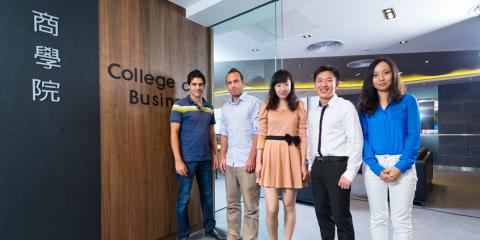
We aim to be a globally-oriented business school, producing innovative and impactful business knowledge, and nurturing leaders for a sustainable future: a key business education hub — in China for the world. The College of Business is internationally accredited by AACSB International and EQUIS. According to the latest UTD World Rankings of Business Schools, the College is also ranked 39th worldwide and 5th in Asia based on its recent research contributions. With a team of over 200 faculty members recruited from around the world, the six academic departments in the College will admit and nurture research students in a diverse range of inter-disciplinary research areas. Our demonstrated strength and international competitiveness in some main research areas are listed below.
PhD Programme Director
Prof. YU Yangxin
3442-7962 (Direct line) / 3442-7760 (General enquiry)
3442-0349
yangxin.yu@cityu.edu.hk
Department of Accountancy
Research in accounting covers a broad spectrum of issues in the areas of financial accounting, auditing, and corporate governance. The major foci in the department include: (1) various accounting issues related to Debt Contracting such as debt covenant violation, debt monitoring, credit quality assessment and the Credit Market in general and Credit Pricing in particular (particularly the market for credit instruments such as credit default swaps); (2) Corporate Governance and External Monitoring issues in the China, US, and international settings as they relate to ownership structures, institutional infrastructures, legal regimes, information environments; (3) Fraud Detection and Tax Avoidance issues such as financial restatement and accounting and auditing enforcement by regulators such as the SEC and/or the CSRC and economic consequences of corporate tax avoidance, economic consequences of internal control reporting, accounting quality versus credit quality, tax complexity and tax compliance; (4) Accounting Disclosure issues such as disclosure and audit quality, earnings management, accounting conservatism, voluntary disclosures or management earnings guidance, and audit pricing.
Research Degree Coordinator
Prof. YU Yangxin
3442-7962 (Direct line) / 3442-7760 (General enquiry)
3442-0349
yangxin.yu@cityu.edu.hk
Department of Decision Analytics and Operations
Research expertise in the Department can be grouped into two streams: (1) Operations research and operations management in a broad sense, including specific areas such as healthcare management, inventory management, revenue management, financial engineering, sustainable operations, supply chain and logistics management, and interdisciplinary research between operations and risk management/marketing/finance/accounting; (2) Business analytics in a board base sense, including big data analytics, data mining, econometrics, credit risk management, optimization, simulation/decision models, marketing analytics, healthcare analytics, and market research.
Research Degree Coordinator
Prof. GUO Pengfei
3442-8672
3442-0189
penguo@cityu.edu.hk
Department of Economics and Finance
Economics research expertise of the Department includes: (1) International Economics: Trade Policy; Intellectual Property Protection; FDI and Global Sourcing; International Migration; International Financial Crises; Exchange Rate Economics; Purchasing Power Parity; Capital Mobility; Globalization; (2) Microeconomics: Auction Theory; Mechanism Design; Experimental Economics; Game Theory; Industrial Organization; Contract Theory; Political Economy; (3) Macroeconomics: Business Cycles; Endogenous Growth; Structural Change; Fiscal and Monetary Policy; Real Estate and Urban Economics; Labor Economics; Consumer Credit; and (4) Econometrics: Econometric Theory; Economic Forecasting; Bayesian Econometrics.
Finance research expertise includes: (1) Corporate Finance: Capital Structure; Payout Policy; Capital Raising; Real Investment; Firm-bank Relationship; Mergers and Acquisitions; Restructuring; Hedging; Corporate Governance and Control; (2) Asset Pricing: Equilibrium Asset Pricing; Equity Return-risk Relationship; Term Structure of Interest Rates; Derivatives Pricing; Financial Engineering; and (3) Investments and Capital Markets: Financial Investments; Market Microstructure; Anomalies; International Financial Management; Financial Services and Intermediation; Fund Management; Credit Risk Management.
Research Degree Coordinator
Economics Discipline
Prof. LI Yunan
3442-5231 (Direct line) / 3442-9583 (General enquiry)
3442-0289
yunanli@cityu.edu.hk
Finance Discipline
Prof. CHEN Zhiyao
3442-9843 (Direct line) / 3442-9583 (General enquiry)
3442-0289
zchen737@cityu.edu.hk
Department of Information Systems
The Doctor of Philosophy Program in Information Systems provides comprehensive training to analyze, develop, implement, evaluate, and manage information systems in various contexts, i.e., from individual to organizational and societal contexts. The research training draws on theories, concepts, and methods from domains such as business information systems, design science, management, operations research, cognitive and social psychology, strategy, and/or economics to study complex and advanced information systems. Particular emphasis is placed on the links between theory and practice and the practical application of innovative information systems methods and techniques to create business values and societal impacts. The research methodologies employed include behavioral methods (qualitative and quantitative), technical modeling, and econometrics. The main areas of research include (1) Digital Transformation and Digital Society; (2) Technological Innovation and Entrepreneurship; (3) Generative AI and Machine Learning;; (4) Business Analytics and Big Data; (5) Sustainability and Green IS; (6) Social Media and Platform Economy; (7) Smart City, Smart Health, and FinTech; (8) Blockchain and Distributed Ledger Technology.
Research Degree Coordinator
Prof. YUE Wei Thoo
3442-9694
3442-0370
Wei.T.Yue@cityu.edu.hk
Department of Management
Research foci/expertise in the Department include (1) Organizational Behaviour: Leadership; Motivation; Decision-making; Creativity and Proactivity; Citizenship and Counterproductive Work Behaviour; Conflict Resolution and Negotiation; Risk and Uncertainty Management; Ethics; Organizational Justice; Work Stress; Emotions; Job Attitudes; Team Dynamics; Cross-Cultural Management, etc; (2) Human Resources Management: Strategic Human Resource Management; Recruitment & Selection; Training & Development; Selection and Assessment, etc; (3) International Business: Internationalization Strategy; International Entry Modes; MNC Control and Staffing; Intercultural Communication; Comparative Management; Culture and Cognition, Cross-Cultural Research Methods, etc; (4) Strategic Management and Entrepreneurship: Corporate Strategy; Corporate Governance; Competitive and Cooperative Strategy; Strategies in Emerging/Transition Economies; Organizational Decision-making; Organizational Changes; Mergers and Acquisitions (M&A); Top Management Teams; New Venture Creation and Management; Venture Capital Firm; IPO; Organizational Innovation and Management, etc; (5) Corporate Social Responsibility: Business Ethics; Stakeholder Management; Corporate Social Responsibility, etc.
Research Degree Coordinator
Prof. WANG Long
3442-7181
3442-0309
longwang@cityu.edu.hk
Department of Marketing
The Department of Marketing is renowned for its robust research in areas such as quantitative marketing, consumer behavior, and marketing strategy. The department excels in interdisciplinary research, integrating insights from economics, psychology, statistics, and digital marketing methods to better understand market dynamics and consumer decision-making. Additionally, the faculty’s research expertise on digital transformation in marketing analytics, competitive strategies, and the implications of emerging technologies on consumer interactions positions the department as a leader in the academic and professional marketing communities.
Research Degree Coordinator
Prof. XU Zibin
3442-4430
3442-0346
zibinxu@cityu.edu.hk
College of Computing

The College of Computing serves as a center of excellence providing professional education programmes in the interdisciplinary fields of Biostatistics, Computer Science and Data Science. These fields are closely related to the advancement of AI and hold tremendous potential for innovation and societal transformation. The College is poised to conduct cutting-edge, collaborative research that develops advanced analytical tools and AI-empowered solutions to tackle complex global challenges. The areas of research excellence and global competitiveness of the College are highlighted by the recent international rankings below.
U.S. News and World Report University Rankings 2024
- Computer Science: 28th
- Artificial Intelligence: 23th
ShanghaiRanking's Global Ranking of Academic Subjects 2023
- Computer Science and Engineering: 29th
QS World University Rankings by Subject 2024
- Computer Science and Information Systems: 77th
- Data Science and Artificial Intelligence: 39th
Times Higher Education World University Rankings 2024
- Computer Science: 64th
Performance Ranking of Scientific Papers for World Universities by National Taiwan University by Subject 2023 (NTU Rankings)
- Computer Science: 13th (1st in Hong Kong)
Department of Biostatistics
The Department’s research expertise and focus encompass several areas, including: (1) Computational Statistics, which covers topics such as Bayesian hierarchical models, empirical Bayes, Markov chain Monte Carlo, statistical machine learning, and large-scale data analysis; (2) Functional Data Analysis, which includes Bayesian inverse problems in physical oceanography, trajectory analysis in life course epidemiology, and oceanography; (3) Inferential Statistics, which involves efficient estimation for semiparametric models, model selection, empirical likelihood, knockoff statistics, non-standard asymptotic theory, and post-selection inference; (4) Statistical Genetics Genomics Omics, which covers the analysis of whole-genome sequencing data and integrative analysis of multi-omics data; (5) Survival and Event History Analysis, which includes competing risks models for HIV/AIDS data, network survival models, counting process, and martingale methods; (6) Time Series Analysis, which covers inference for stochastic processes, statistical finance, and risk management; (7) Causal Inference, which deals with methods for identifying causal relationships from observational or experimental data, with applications in medical research; (8) Spatial Statistics, which focuses on the analysis of data with spatial or spatio-temporal structure, including applications in epidemiology and public health; and (9) Deep Learning, which involves the development of algorithms and models for learning from complex and high-dimensional data, with applications in medical imaging, diagnosis, and treatment.
Research Degree Coordinator
Prof. Jinfeng XU
3442-4183
3442-0613
jinfenxu@cityu.edu.hk
Department of Computer Science
Research focus and expertise in the Department include: (1) Multimedia Computing: Computer Vision; Computer Graphics; Audio Analysis; Speech Processing; Natural Language Analysis; Computer Games; Virtual Reality; Augmented Reality; Mixed Reality; Medical Imaging; Image Processing; Image and Video Coding; Human Motion Analysis; Perception, Neuroscience and Brain Informatics; Multimedia Analytics; Multimedia Information Retrieval; Wearable Computing; Social Media; Mobile Media; Pen Computing; Human Computer Interaction; Multi-modal Data Fusion; (2) Computer Systems and Security: Information Security; Cloud Computing; Internet of Things (IoT); Mobile Computing; Distributed Algorithms and Systems; Data Center Networks; Cyber-Physical Systems; Vehicular Networks; Sensor Networks; Wireless Security; Wearable Sensing; Traffic Estimation; Urban Computing; (3) Applied Algorithms: Bioinformatics; Data and Internet Security; Equilibrium Algorithms; Scheduling; Applied Cryptography; Algorithmic Game Theory; Heuristics; Blockchain; Cryptocurrency; (4) Artificial Intelligence and Big Data Analytics: Knowledge Management; Data Science; Big Data Analytics; Machine Learning; Artificial Intelligence; Database; Optimization; Text Mining; Information Retrieval; Semantic Object Modeling; Data Mining; Data Warehousing; Multimedia Data Indexing; XML and Interoperability; Workflow and Web Services; Recommender Systems; Sentiment Analysis; Deep Learning; Generative Models; Supervised Learning; Semi-supervised Learning; Unsupervised Learning; Neural Networks; (5) Systems, Software Engineering and Internet Applications: Internet Applications; Embedded Systems; Parallel Architecture; Real-time Systems; Software Engineering; E-commerce; E-learning; Innovative Technology for Education; Programming Languages and Systems; Empirical Software Engineering; Software Data Analytics; Software Quality; System Modelling; Software Defect Prediction; Software Effort Estimation; Software Testing; Software Project Management; Machine Learning in Software Engineering; Decentralized Application; Program Debugging; Intelligent Transportation Systems; Storage Systems; (6) Evolutionary Computation: Multiobjective Optimization; Swarm Intelligence; Multi-agent Evolutionary Optimization; Neurodynamic Optimization; Intelligent Control; Intelligent Marine Vehicles; Decomposition Based Algorithms; Computational Intelligence; Fuzzy Systems.
Research Degree Coordinator
Prof. ZHANG Qingfu
3442-8580
3442-0503
qingfu.zhang@cityu.edu.hk
Department of Data Science
The Department of Data Science at CityUHK is one of the first in the world dedicated to leading the development of this new discipline. The Department comprises an interdisciplinary faculty team of leading academics in multiple areas including data science foundations (machine learning, statistics, optimization, and AI for Science) as well as data science powered applications (smart cities, Industry 4.0, FinTech, energy, public health, and precision medicine). Our PhD programme aims to offer students solid fundamentals of data science, which cover machine learning, statistics, computing, data analytics, and optimization, and nurture them to produce state-of-the-art research in data science. Selected research areas include:
- Machine Learning Theory and Algorithms (including deep learning, statistical learning, optimization, and reinforcement learning, etc.)
- Artificial Intelligence for Science
- Smart Cities and Industrial AI (Internet of Things, smart manufacturing, intelligent transportation, power and energy systems, smart healthcare and precision medicine, etc.)
- Business Data Analytics and Financial technology (FinTech)
- Data Science for Social Media, Innovation, and Policy
Research Degree Coordinator
Prof. WU Qi
3442-7018
3442-0515
qiwu55@cityu.edu.hk
College of Engineering
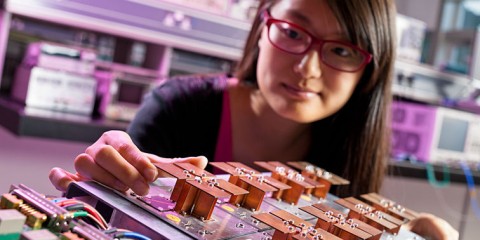
The College comprises six academic units providing quality education programmes with an emphasis on interdisciplinary studies: Architecture and Civil Engineering; Electrical Engineering; Materials Science and Engineering; Mechanical Engineering; and Systems Engineering.
The College has a strong international reputation in research, as evidenced by recent international rankings:
U.S. News and World Report Global University Rankings (2024)
By subjects
- Artificial Intelligence: 23rd
- Chemical Engineering: 33rd
- Civil Engineering: 78th
- Computer Science: 28th
- Electrical and Electronic Engineering: 29th
- Engineering: 20th
- Green and Sustainable Science and Technology: 41st
- Materials Science: 9th
- Mechanical Engineering: 42nd
- Nanoscience and Nanotechnology: 10th
ShanghaiRanking Global Ranking of Academic Subjects (2023)
- Automation & Control: 8th
- Chemical Engineering: 47th
- Civil Engineering: 27th
- Computer Science & Engineering: 29th
- Electrical & Electronic Engineering: 45th
- Energy Science & Engineering: 9th
- Instruments Science & Technology: 32nd
- Library & Information Science: 1st
- Materials Science & Engineering: 21st
- Mechanical Engineering: 46th
- Metallurgical Engineering: 10th
- Nanoscience & Nanotechnology: 17th
- Telecommunication Engineering: 36th
- Transportation Science & Technology: 32nd
Quacquarelli Symonds (QS) World University Rankings
World University Rankings: 62nd (2025)
Asia University Rankings: 17th (2024)
By subjects (2024)
Top 100 in:
- Architecture & Built Environment
- Computer Science & Information Systems
- Data Science and Artificial Intelligence
- Engineering – Civil & Structural
- Engineering – Electrical & Electronic
- Materials Science
Performance Ranking of Scientific Papers for World Universities by National Taiwan University (NTU Rankings)
By fields – Engineering (2023): 22nd
By subjects (2023)
- Chemical Engineering: 41st
- Civil Engineering: 85th
- Computer Science: 13th
- Electrical Engineering: 11th
- Energy Science & Engineering: 14th
- Materials Science: 16th
- Mechanical Engineering: 18th
Furthermore, the remarkable achievements of the College are exemplified by the State Key Laboratory of Terahertz and Millimeter Waves, the Chinese National Engineering Research Center: Hong Kong Branch of National Precious Metals Material Engineering Research Center, and a number of research centres in Advanced Structural Materials, Complexity and Complex Networks, Robotics and Automation, etc.
Department of Architecture and Civil Engineering
Research expertise in the Department mainly focuses on Sustainable Development of the Built Environment which includes: (1) Civil Engineering (including Structural, Geotechnical Engineering, Transportation, Smart City and Intelligent Construction Engineering and Management): Advanced Construction Materials (3D printing concrete; geopolymer concrete, ultra-high performance concrete; fiber-reinforced polymer composites, fiber-reinforced cementitious composites); Rheology control of cementitious materials; Carbon capture; Waste recycling and upcycling; Environmental microbiology and biotechnology; Computational mechanics; Engineering mechanics; Nano-mechanics; Composite structures; Multiscale modeling; Wind engineering; Hydrology; Computational Fluid Dynamics (CFD); Seismic response and disasters; Structural integrity and diagnosis; Repair and strengthening of existing structures; Climatic change and hazard mitigation; Experimental soil mechanics; Micromechanics of soils; Machine learning and data analytics in geotechnical engineering; Geotechnical risk; Reliability and uncertainty; Landslides; Transportation; Pedestrian flow; Pavement materials and structures; Smart city development; Big data for construction project management; Construction robotics and human-robot interaction; Building information modeling and digital twin; AI-generated contents. (2) Architectural Engineering: Building systems and facilities management; Building sustainability; Building energy efficiency; Green and low-carbon buildings; Advanced ventilation; Natural and artificial lighting; Thermal comfort; Indoor and regional air quality; Fire safety engineering, Fire Evacuation. (3) Architecture: Construction and land economy; Architectural design, history, theory, ecology and technology; Landscape architecture; Architectural science. (4) Surveying and Urban Planning: Building information modelling; Building contracts and laws, and Disputes and resolutions; Real estate development, Urban climate; Urbanism, urban design and planning; Digital twin; Blockchain.
Research Degree Coordinator
Prof. HUANG Gongsheng
3442-2408
3442-0427
gonhuang@cityu.edu.hk
Department of Electrical Engineering
The Department offers research degree studies in a wide range of research themes: (1) Antenna Design: computational electromagnetics, antenna theory, and metasurfaces; (2) Big Data, Machine Learning, and Artificial Intelligence: pattern recognition and machine learning in biomedical applications; (3) Bioinformatics: genomic sequence analysis and genome annotation; (4) Biomedical Systems, Biosensors, and Bioelectronics: biomedical imaging, neural prosthesis, visual prosthetics, and visual electrophysiology; (5) Computer Engineering: computer graphics and vision, cloud computing, computer architecture, embedded systems, and evolutionary computing; (6) Control Systems and Optimization: intelligent and networked control, complex networks, and nonlinear circuits and systems; (7) Microelectronic Devices and Circuits: micro-electromechanical systems (MEMS), biomedical sensors, and microsystems; (8) Nanotechnology and Nanodevices: nanophotonics, nanomaterials, and nanofabrication; (9) Networking and Internet of Things: optical networks, wireless networks, computer networks, queueing theory, performance evaluation; and security and cryptography; (10) Photonics: fiber and integrated optics, plasmonics, microwave photonics, and optical communications; (11) Power Electronics and Systems: power electronics and smart grids; (12) Signal and Image Processing: biomedical image processing and analysis, image segmentation and registration, and image compression; (13) Terahertz and Millimeter Waves: terahertz science and technology, active terahertz devices, and millimetre-wave circuits; (14) Wireless Communications: wireless communications, wireless sensor networks, information theory, coding theory and techniques, visible light communications, and data storage systems.
Research Degree Coordinator
Prof. Leanne CHAN
3442-9120
3442-0562
lhlchan@cityu.edu.hk
Department of Materials Science and Engineering
The Department has state-of-the-art fabrication and characterization facilities for a wide range of research areas related to materials science and engineering. The faculty members of the Department carry out both fundamental and applied research under the three major targeted areas, namely, Functional materials, Structural materials and Computational materials. For (1) Functional materials, key elements include nanomaterials, organic light-emitting diode material, photovoltaic materials, energy storage related materials, sensing and detection, as well as photonics and optoelectronics materials. For (2) Structural materials section encompasses phase transformations, SMT solder joints, creep and life assessment, in-service behaviour of materials, stress analysis, structural materials design, surface science and engineering, thin films and coatings, metals and alloys, plastics and composites, shape memory alloys, and electrical ceramics. For (3), Computational materials include density functional theory calculation, molecular dynamic simulation, phase field modelling and multiscale modeling of mechanics of materials. In addition, members of the Department have collaborations around the world and are well-recognised in their research expertise. The ultimate goal of the department is to prepare graduates with professional knowledge, exploring spirit and leadership skills for the future world.
Research Degree Coordinator
Prof. ZHANG Qichun
3442-9988
3442-0892
qiczhang@cityu.edu.hk
Department of Mechanical Engineering
The Department has state-of-the-art fabrication and characterization facilities for a wide range of research areas related to materials science and engineering. The faculty members of the Department carry out both fundamental and applied research under the three major targeted areas, namely, Functional materials, Structural materials and Computational materials. For (1) Functional materials, key elements include nanomaterials, organic light-emitting diode material, photovoltaic materials, energy storage related materials, sensing and detection, as well as photonics and optoelectronics materials. For (2) Structural materials section encompasses phase transformations, SMT solder joints, creep and life assessment, in-service behaviour of materials, stress analysis, structural materials design, surface science and engineering, thin films and coatings, metals and alloys, plastics and composites, shape memory alloys, and electrical ceramics. For (3), Computational materials include density functional theory calculation, molecular dynamic simulation, phase field modelling and multiscale modeling of mechanics of materials. In addition, members of the Department have collaborations around the world and are well-recognised in their research expertise. The ultimate goal of the department is to prepare graduates with professional knowledge, exploring spirit and leadership skills for the future world.
Research Degree Coordinator
Prof. ZHANG Kaili
3442-7845
3442-0235
kaizhang@cityu.edu.hk
Department of Systems Engineering
The Department provides high quality educational and research experiences in disciplines related to systems engineering, intelligent manufacturing and industrial engineering, preparing graduates for professional and leadership roles in industry and academia. The Department carries out research in a number of multidisciplinary areas. Research in the Department includes Manufacturing systems, Semiconductor Manufacturing, Cyber-physical systems, Automation, Operations management, Industrial statistics, Reliability Engineering, Logistics and Supply Chain, Human Factors Engineering, Entrepreneurship, Project Management, Quality Management, etc.
Research Degree Coordinator
Prof. Min XIE
3442-9596
3442-0173
minxie@cityu.edu.hk
College of Liberal Arts and Social Sciences
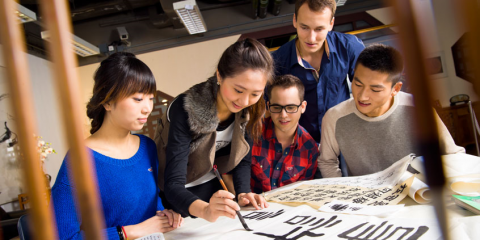
The College of Liberal Arts and Social Sciences (CLASS) at City University provides leading educational programmes in the field of Humanities and Social Sciences. It is home to seven academic units spanning a wide range of subjects. These are the Departments of Chinese and History; Linguistics and Translation; English; Media and Communication; Public and International Affairs; Social and Behavioural Sciences; and Chan Feng Men-ling Chan Shuk-lin Language Centre.
In the QS World University Rankings by Subject 2024, CLASS is ranked 100th in Social Sciences and Management and 151th in Arts and Humanities among over 1000 universities. With respect to individual subjects, CLASS also puts in a strong performance, in which Linguistics is ranked 51st amongst world’s top universities by QS World University Rankings by Subject 2024. The College prides itself in its research reputation, and is also concerned to provide excellent opportunities for research degrees at the level of MPhil and PhD studies.
Department of Chinese and History
Research foci and expertise in the Department include: (1) Chinese Language and Literature: Classical Chinese Literature, Modern Chinese Literature, Chinese Classical Studies (jingxue), Chinese Literary Criticism, Chinese Philosophy, Classical Chinese Language; (2) Cultural Heritage and Cross-cultural Studies: Art History, Anthropology, Cultural Heritage, Digital Humanities, Comparative Literature; and (3) Chinese History: Archaeology, Tang-Song-Yuan Studies, Ming-Qing Studies, Modern History, Urban History, History of Buddhism, History of Medicine, History of Cultural Exchange. The programme places equal importance on the use of both Chinese and English languages.
Department of English
Research strengths in the Department include: (1) Discourse Analysis: conversation analysis, corpus-assisted discourse analysis, critical discourse analysis, genre analysis, mediated discourse analysis, multimodal discourse analysis, pragmatics, semiotics, and text analysis; (2) Applied Linguistics and Language Teaching: identity, intercultural communication, language policy and planning, pedagogical grammar, second language acquisition, second language writing, self-access learning, language teacher identity; (3) Professional Communication: business communication, English for specific purposes, language and law, persuasive communication, rhetoric of science, health and risk communication; (4) Language, Technology, and Media: computer-assisted language learning, digital literacies, language and mobile communication, and online discourse; and (5) English-medium Instruction: incidental language acquisition in the English-medium environment, pedagogical approaches to teaching and learning in EMI settings, professional discoursal skills in EMI; and (6) Literary Studies: World literature in English, postcolonial literature, modern and contemporary novel, nineteenth-century literature and culture, crime fiction, travel writing and comparative literature. (7) Theatre and Performance Studies: Modern and contemporary drama, performance studies; (8) Cultural Studies: Film studies and visual culture, fashion studies, creative industries and popular culture.
Research Degree Coordinator
Prof. Alice CHAN
3442-9752
3442-0288
enalice@cityu.edu.hk
Department of Linguistics and Translation
The Department of Linguistics and Translation takes a systematic approach to the study of language from a number of different perspectives with a broad range of methodologies. Research foci and expertise cover (1) Empirical and Experimental Linguistics, including computational linguistics, corpus linguistics, neurolinguistics, and psycholinguistics; (2) General Linguistics, including formal linguistics, e.g. semantics, syntax, morphology, phonology, phonetics (and their interfaces), functional linguistics, historical linguistics, sociolinguistics, and text linguistics; (3) Pedagogical Linguistics, including applied linguistics, second language learning and teaching, linguistics-based pedagogy to language teaching, contrastive linguistics of English and Chinese, and teaching Chinese to speakers of other languages; (4) Translation and Interpretation, including translation and interpretation studies, translation theories, computer-aided translation, machine translation and terminology.
Research Degree Coordinator
Prof. Alex FANG
3442-8793
3442-0359
acfang@cityu.edu.hk
Department of Media and Communication
Research foci of the Department include: (1) New Media and Technology: diffusion, use, and effects of communication technology; impact of online and mobile media; computer-mediated communication; human-computer interaction; policy and regulation; business strategy; (2) Media Institutions and Society: state-society-media relationships; news production; media organizations; journalists and professionalism; social influence of media content; (3) Political Communication: public opinion, civic and political participation, political campaigns; (4) Media Psychology and Effects: cognitive processing, media effects; interactive advertising; (5) Computational Communication Research: social media/network analysis, big data mining; computational social science; (6) Health Communication: persuasion, healthcare narratives, health message processing; (7) Strategic Communication: public relations, advertising, integrated marketing communications.
Research Degree Coordinator
Prof. Marko SKORIC
3442-8990
3442-0228
mskoric@cityu.edu.hk
Department of Public and International Affairs
The Department of Public and International Affairs (PIA) is an internationally-leading research hub for public policy, international studies, philosophy, and urban governance. Our staff come from top universities around the world, and our PhD students are very successful in gaining positions in government, academia, business, and with non-governmental organizations. We are one of the leading departments for winning HKPFS awards, and guarantee excellent training and resources for our doctoral students. Studying in PIA exposes students to leading debates and techniques across the field and its subdisciplines as well as provides students with the opportunity to discuss their research with visiting scholars from around the world.
PIA graduates are people who can communicate effectively, possess strong leadership skills and have the necessary analytical skills to dissect societal problems and make improvements to the world. Our faculty have well established track records in taking their academic research and making an impact on Hong Kong and global institutions. PIA professors are frequently interviewed in the international and local media on issues of daily concern.
The personal and professional development of PhD students is central to PIA’s education strategy. Students will have opportunities to gain international experience, publish their research, and develop their pedagogical skills alongside top faculty members; all of which leaves our PhD students well-placed for careers in academia, thinktanks, private and public sectors after graduation. Joining PIA means joining one of the leading departments in Hong Kong and across Asia. According to the QS World University Rankings 2023, CityU ranks the 54th in the world, and the 4th for the “top 50 under 50”. As for the 2023 Global Ranking of academic subjects, our public administration is the 1st in Hong Kong, and 2nd in Asia, 23rd in the world, while political science is also the 1st in Hong Kong.
Research Degree Coordinator
Prof. LIU Dongshu
3442-9557
3442-0413
dongsliu@cityu.edu.hk
Department of Social and Behavioural Sciences
The Department’s research expertise encompasses a broad range of topics across several disciplines, including: (1) Applied Sociology: work, labour, class, organization, community, family, gender, ethnicity, deviance, welfare, politics, quality of life, social capital, social movement, social policy, social problem, civil society, and social development; (2) Psychology: cognitive biases, self-concept, educational psychology, intimate relationship, stress and emotional regulation, health psychology, positive ageing, creativity, aggression, resilience, and human values; (3) Social Work: casework, groupwork, community work; working with children, youth, elderly and family; population ageing, social determinants of health, family violence, empowerment-oriented practice with socially disadvantaged groups, conflict management and mediation, volunteerism, and social work management and supervision; (4) Counselling: cognitive behavioural therapy, narrative therapy, family therapy, parent education and support, marriage enrichment, and psychotherapy process; school bullying, childhood and adolescent aggression, peer victimization, depression and suicide; and (5) Criminology: restorative justice, youth justice, organised crime, juvenile delinquency, Chinese criminology, anti-corruption, policing, crime prevention, school bullying, gang and outreach youth work, and cybercrime. Existing research works often tap on the expertise of different disciplines. For example, the development of caregiver assessment model is supported by a team from social work, and psychology disciplines.
Research Degree Coordinator
Prof. Sam YE
3442-8114
3442-0283
sam.ye@cityu.edu.hk or ssrdpmp@cityu.edu.hk
College of Science
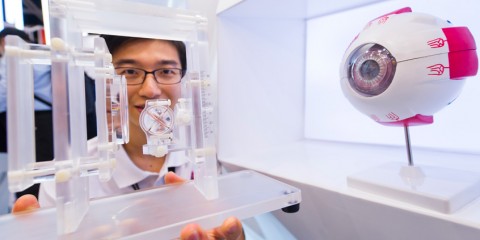
The College of Science (CSCI) strives to offer quality research degree programmes in the departments of Chemistry, Mathematics, and Physics. Drawing upon the diverse expertise of the internationally recognised faculties and the state-of-the-art research facilities, the College offers focused curriculum and rigorous research training to our research degree students. With a vision to generate research of regional and global impact in theoretical and applied sciences, the College equips the students with transferrable skills and attributes necessary for a career in academia, entrepreneurship and beyond.
The excellence in research as accomplished by the College can be highlighted by the State Key Laboratory of Marine Pollution (City University of Hong Kong), the Liu Bie Ju Centre for Mathematical Sciences, and the Centre for Neutron Scattering. In addition, the College has a strong international reputation in research and our outstanding academic rankings are highlighted below.
Nature Index 2021 Young Universities
6th in Chemistry
9th in Physical Sciences
US News & World Report: Best Global Universities Rankings 2024
9th in Condensed Matter Physics
9th in Physical Chemistry
14th in Optics
33rd in Chemical Engineering
49th in Mathematics
53rd in Chemistry
ShanghaiRanking’s Global Ranking of Academic Subjects (GRAS) 2023
43rd in Chemistry
47th in Chemical Engineering
Nature Index: Leading Institution of Research Leader 2024
47th in Physical Sciences
58th in Chemistry
Times Higher Education (THE) World University Rankings by subject, 2024
52nd in Chemical Engineering
65th in Physical Sciences
Performance Ranking of Scientific Papers for World Universities by National Taiwan University 2023
63rd in Chemistry
64th in Physics
79th in Mathematics
Quacquarelli Symonds (QS) World University Rankings by Subject 2024
86th in Mathematics
Department of Chemistry
The Department is very unique in a multidisciplinary nature by integrating Chemistry, Biology, and Environmental Science. Research focus/ expertise in the Department include:
(1) Synthetic Chemistry: green chemistry; spectroscopy and catalysis; catalyst design and synthesis; organic electroluminescent devices; inorganic photo-responsive and luminescent chemosensors; organometallic chemistry; homogeneous catalysis;
(2) Materials Chemistry: green materials/manufacturing; organic and inorganic functional materials; nanoscience and nanotechnology; organic light-emitting devices; crystal phase control; solar cells;
(3) Biological Chemistry: chemical biology; bioinorganic chemistry; bioorganic chemistry; developmental and cell biology; nano-biotechnology and biosensing; DNA and RNA chemistry; genomics and biotechnology; proteomics and metabolomics;
(4) Computational Chemistry: energetics and reactivities of chemical species; mechanisms of chemical reactions;
(5) Environmental Chemistry: freshwater and marine pollution; aquatic ecology and conservation; renewable energy, energy storage and management, energy efficiency and conservation; ecotoxicology; environmental monitoring; environmental impact and risk assessment.
Research Degree Coordinator
Prof. Guangyu ZHU
3442-6857
3442-0522
guangzhu@cityu.edu.hk
Department of Mathematics
Research strengths/disciplines of the Department include: (1) Applied Analysis: approximation theory, asymptotic analysis, harmonic analysis, inverse problems, kinetic theory, learning theory, partial differential equations, random matrix theory, and special functions; (2) Computational Mathematics: complexity theory, computational electromagnetics, image processing, numerical analysis, numerical linear algebra, and scientific computing; (3) Mathematical Modelling: control and system theory, fluid mechanics, general relativity, granular materials, mathematical biology, mathematical elasticity, mathematical finance, mathematical modelling of waves, and mathematics of new materials; (4) Probability and Statistics: Bayesian statistics, high dimensional data analysis, mean field games, probability theory, statistical learning theory, stochastic analysis, stochastic controls, and stochastic processes.
Research Degree Coordinator
Prof. Shun ZHANG
3442-9931
3442-0250
szhang26@cityu.edu.hk
Department of Physics
Research focus/expertise in the Department include: (1) Theoretical and Computational Physics: condensed matter theory, computational solid state physics, computational electrodynamics, computational chemistry, computational biology physics, quantum computation and information, quantum simulation with cold atoms, machine learning; (2) Spectroscopy and Imaging: sophisticated experiments involving quantum beams such as synchrotron x-ray, neutron, electron, coherent light, and NMR, structure and phase transition in glass and liquids, Boson peak and the dynamics of glass and liquids, quantum interactions such as spin-orbit coupling in multiferroics, single molecule electronics; (3) Atomic, Molecular, and Optical Physics: mechanism of noise and decoherence, open quantum system and quantum entanglement, multi-photon interference, non-equilibrium physics in AMO system, nonlinear optical spectroscopy, opto-mechanics, photonic crystals and metamaterials; (4) Quantum Materials: topological quantum computing and Majorana fermions, Dirac and Weyl semimetals, Bose-Einstein condensation and spin-orbit coupling, quantum Hall Effect, transport phenomena, superconductivity, frustrated magnetism, 2D materials, heterostructures and interfaces; (5) Soft Matter and Biophysics: dynamics of protein and subcellular processes, emergent phenomena in live cells, non-equilibrium mechanisms in active living matter, biological networks, biological and clinical experiments, novel physics-based data acquisition protocol, instrumentation in biomedical imaging, radiation biophysics, ion-track technology; (6) Astrophysics and Particle Physics: dark matter, black holes, gravitational waves, cosmology, and high energy theory.
Research Degree Coordinator
Prof. LI Haixing
3442-4427
3442-0538
haixinli@cityu.edu.hk
Jockey Club College of Veterinary Medicine and Life Sciences

The College strives to be at the frontier of veterinary, public health and biomedical research and discovery. Our cutting-edge research in these areas thematically operates under the “One Health” concept, which recognizes the interconnectedness of human and animal health. The College fosters interdisciplinary collaborations involving a wide range of scientific disciplines aimed at achieving optimal health outcomes for people, animals and the environment within a local, regional and international context.
The College offers three PhD programmes at college and departmental levels:
1. Doctor of Philosophy in Veterinary Medicine (offered at college level);
2. Doctor of Philosophy in Infectious Diseases and Public Health;
3. Doctor of Philosophy in Veterinary Clinical Sciences.
Jockey Club College of Veterinary Medicine and Life Sciences
The Interdisciplinary PhD Programme in Veterinary Medicine (VM/P) is open to outstanding graduate students who wish to conduct state-of-the-art basic, clinical and translational life sciences research alongside research professionals. The students will participate in research programmes leading to PhD degrees in one of the following areas and will be jointly supervised by a faculty advisor from CityUHK and a faculty advisor from Cornell University.
• Comparative Biomedical Sciences
• Immunology & Infectious Disease
• Molecular & Systemic Neuroscience
• Public Health & Epidemiology
The programme is student-centred and led by faculty who are accessible, engaged and committed to ensuring that our postgraduate students reach their full potential in research, teaching and professional development. In addition, students will be provided the unique opportunity with financial sponsorship to conduct research work at the Cornell University co-supervisor’s laboratory at Ithaca, New York, for a period of 3 to 12 months during their senior years of studies.
Research Degree Coordinator
Prof. Pedro MELENDEZ
3442-4335
3442-0549
pmelende@cityu.edu.hk
Department of Infectious Diseases and Public Health
The Department focuses on One Health, an area spanning the health of animals, humans and the environment. Our principal research areas include:
- enhancing an understanding of the pathogenesis and natural history of infectious diseases in animals, with the overarching aim of improving methods for their diagnosis and control
- improving animal health and welfare through application of more effective disease control methods
- supporting the efficient and economic production of safe, both terrestrial and aquatic, animal-based food and other derived products
- monitoring current and emerging infectious diseases in animals that may impact on human health, including drug-resistant pathogens
- fostering collaborations between medical and veterinary personnel in the provision of targeted public health measures
- improving animal welfare through research, teaching and public education
Research Degree Coordinator
Prof. CAI Wenlong
3442-2627
3442-0139
wenlocai@cityu.edu.hk
Department of Veterinary Clinical Sciences
The Department of Veterinary Clinical Sciences has a clear vision to be Asia’s preeminent body advancing veterinary clinical science in response to evolving societal needs.
The research mission of the Department of Veterinary Clinical Sciences is to advance animal health through cutting-edge clinical research. We seek to deliver translational solutions for common and emerging clinical problems. Our research themes include:
• Disease emergence in shelter-housed animals
• Viral oncology
• Advancing animal welfare
• Advancing veterinary medical education
• Production diseases in farm animals
• Equine diseases and welfare
Research Degree Coordinator
Prof. CHIU Elliott Sinming
3442-7235
elliott.chiu@cityu.edu.hk
School of Creative Media
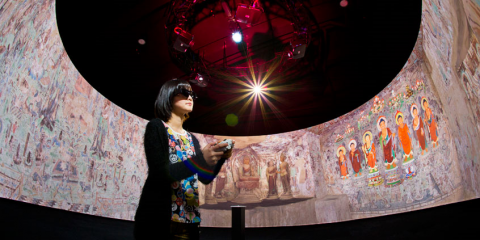
Established in 1998, the School of Creative Media at City University of Hong Kong is the birthplace of a new generation of transmedia specialists, who are skilled in the technologies of digital media and in the analysis of digital media content and form. The School has now established itself to be a leader in creative media education in Asia.
The School’s interdisciplinary research activities encompass and combine all aspects of art and new media creation, incorporating methodologies based in the sciences, the humanities, and the social sciences: multimedia technology, video and image computing, distributed mobile computing and wireless networking, artificial intelligence and data management systems, software engineering and internet applications, multimodal interface design, interactive and embodied media, virtual and augmented reality, the cinematic arts, photography, computer graphics and animation, sound art and musical composition, installation arts, urban media art, game design, physical computing, digital cultural heritage, and the historical, theoretical, and critical analyses of all of these areas, including the ethical, social and aesthetic implications of emerging technologies on art and new media creation.
The Run Run Shaw Creative Media Centre, designed by the world-renowned architect Daniel Libeskind, provides purpose-built facilities for the School in nurturing the next generation of transmedia specialists and has become an iconic landmark in the territory. It is a hub for creative professionals from all over the world seeking new opportunities for collaboration in the rapidly-evolving creative industries. The School is equipped with state-of-the-art teaching and research facilities with VR/AR development kits, 4K cameras, advanced immersive digital visualization systems, including a 360-degree 3D projection environment and one of the industry’s best 24-camera optical motion capture systems.
Research Degree Coordinator
Prof. Richard ALLEN
3442-0408
smgo@cityu.edu.hk
Go to Department Website
School of Energy and Environment

As a core strength of the School of Energy and Environment, we employ multi- and inter-disciplinary approaches to address various cutting-edge issues in Energy and Environment. Our research covers a diverse scope, ranging from energy conversion and generation, energy efficiency and storage, to atmosphere and climate change, water and waste, as well as to sustainability and policy. Our visions are to conduct both fundamental research and to develop novel technologies that will eventually enhance the energy and environmental sustainability.
Research at the School of Energy and Environment takes a system approach to develop innovative science and engineering solutions and to provide empirically based evidence and insight from the evaluation of these solutions, eventually to understand how they can be successfully applied to our cities.
Research focus/expertise in the School includes three major areas:
(A) Energy
Energy Conversion; Clean and Green Fuel; Energy Efficiency; Energy Storage
(B) Environment
Air and Water Pollution Control and Management; Climate Change Modelling, Mitigation and Adaptation; Waste to Energy and Resources
(C) Sustainability
Urban Sustainability for Smart Cities; Energy and Sustainable Economics; Low-Carbon Innovation; Policy Design and Analysis
Research Degree Coordinator
Prof. SHANG Jin
3442-7714
3442-0688
jinshang@cityu.edu.hk
Go to Department Website
School of Law

The School of Law at CityUHK fosters a culture of integrated research and teaching, drawing on the expertise of its faculty and a diverse and representative student body, thus contributing to relevant and fundamental research in Hong Kong, Mainland China, and beyond. The School aspires to attract dedicated postgraduate students to contribute to the School’s varied research activities. Graduate students will benefit from the School’s research culture, which emphasises both fundamental and applied aspects of legal studies and research. The School likewise encourages research with local relevance, comparative insights, and critical analyses. The study of law in any given jurisdiction presupposes and necessitates particularity, context, and geographical specificity. Law students can therefore first and foremost expect to be trained in the laws of Hong Kong. But this approach does not imply parochialism. The law school’s approach is premised on a proper appreciation of the broader regional, cultural, and international contexts that shape the development of the law as a dynamic field of study. This is especially important in the case of Hong Kong, with its service-based economy, multicultural population and common law heritage.
The subject areas offered and research specialisations available at the School of Law include the usual and expected core curriculum of legal studies, namely private law (the law of persons, contract law, tort law etc.), commercial law (company law, consumer protection law, competition law etc.), criminal justice (criminal law, criminal procedure, evidence, and criminology), public law (constitutional law, administrative law, and human rights etc.), and international law, including public international law. In addition to the core curriculum, the School makes it a priority to teach and engage in research in strategic areas that add value to its core curriculum, attract postgraduate students, and provide staff with opportunities to develop existing areas of law and to expand the School’s impact in specific areas of expertise. These strategic research areas include, but are not limited to, Chinese and Comparative Law, Maritime Law, and Arbitration and Dispute Resolution.
Research Degree Coordinator
Prof. ZHU Guobin
3442-7288
3442-0190
lwzhugb@cityu.edu.hk
Go to Department Website
